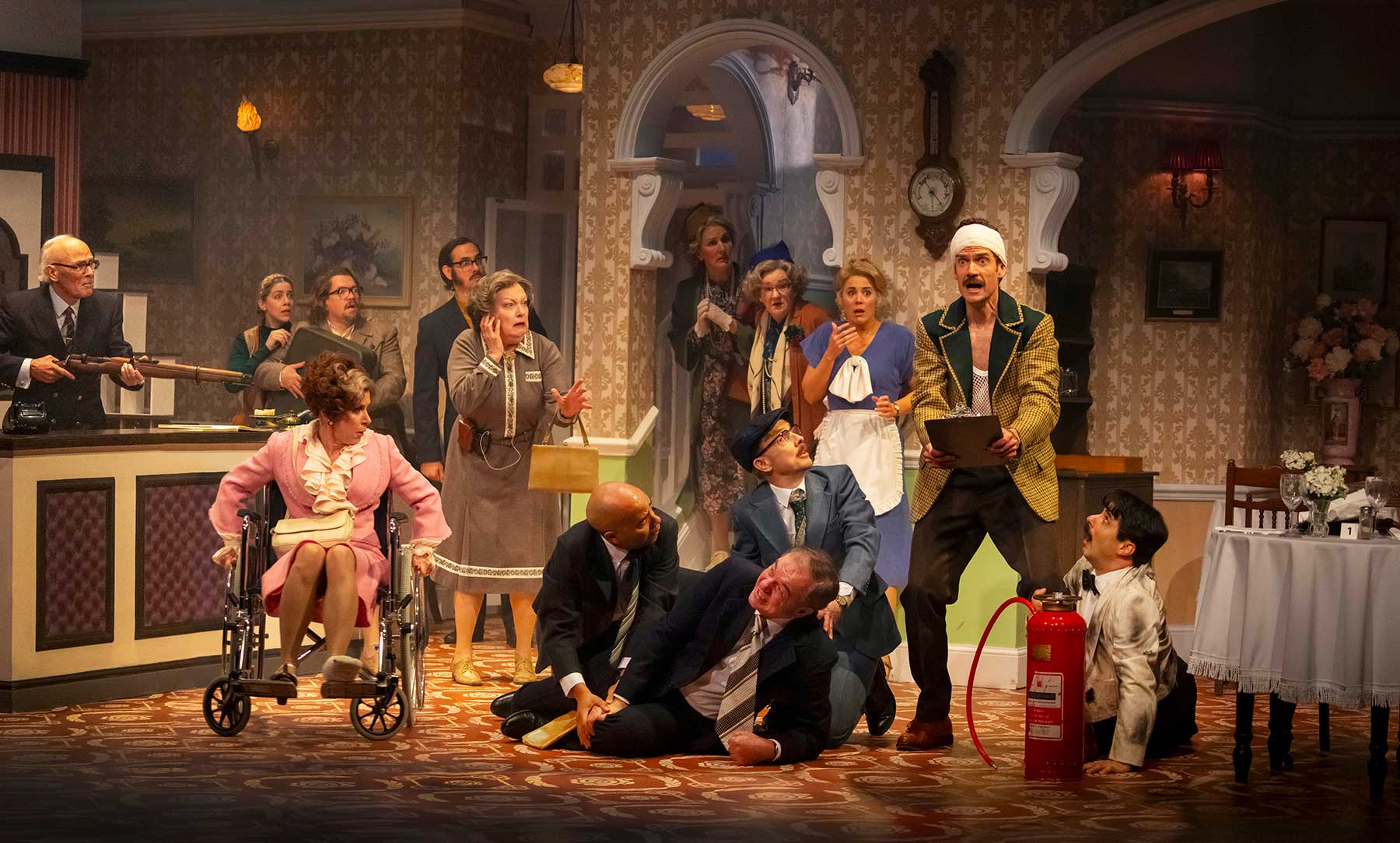
Bringing one of Britain’s best known and most beloved sitcoms to the stage was always going to have its challenges. Would it be as good as it was on the television? Would the jokes still land? Would a new cast be able to capture the magic of the original actors? Fawlty Towers: The Play, currently showing at the Apollo Theatre in London, does a pretty good job at being re-worked into a stage production but it doesn’t quite live up to the legacy of the television episodes.
The premise of the play is the same as the television show: Basil Fawlty is the eccentric, rude and sometimes aggressive owner of a hotel in Torquay which he runs with his domineering wife Sybil, a down to earth and practical chambermaid Polly and a good natured but hapless Spanish waiter called Manuel. A variety of hotel guests create a range of issues for them and from this derives the humour.
The play is an adaptation by John Cleese of three of the television episodes which he originally wrote with his then wife Connie Booth. Although I say adaptation, it’s mostly a direct copy of the television episodes and little has been done to the script to turn it into a more theatrical experience. It’s not even a mash-up of the episodes, it’s just each of the three stories faithfully replicated and played out one after the other. This means it’s almost impossible to watch without making comparisons to the television series.
The three episodes that provided the source material are Hotel Inspectors in which Basil mistakes an overly officious guest for an hotel inspector, Communication Problems where Mrs Richards, a hard of hearing and cantankerous guest stays at the hotel and The Germans in which Basil is concussed by a moose’s head falling on him causing him to behave even more erratically than usual and leads to him offending a group of Germans staying at the hotel.
Closely copying the television episodes is both the strength and weakness of this stage play. Where it really shines is in its faithful recreation of the characters. Stepping into Basil Fawlty’s shoes would be a daunting task for many actors, yet Adam Jackson-Smith delivers a performance of great technical skill and brilliance. He captures Basil’s trademark physicality, his manic energy, mannerisms, and the clipped delivery of his voice.
The long-suffering Polly is played by Victoria Fox, who perfectly embodies the character and the mid-Atlantic voice of the role first created by Connie Booth. Anna-Jane Casey portrays the exasperated Sybil Fawlty with an air of superiority that the audience would expect from her character while Hemi Yeroham brings a large dose of physical comedy and likeability to his portrayal Manuel. The chemistry and interplay among these actors beautifully echo the dynamic that initially defined their characters as an irresistible ensemble.
The supporting cast is equally strong and the stand out performance is by Rachel Izen who is outstanding in her portrayal of the formidable Mrs. Richards. Her performance is a brilliant combination of comic timing and assured delivery. Also, Paul Nicholas whose portrayal of the delightfully clueless Major, has several scene-stealing moments.
The set design by Liz Ashcroft meticulously recreated the Fawlty Towers lobby, dining area and on an upper level, one of the hotel bedrooms. Anyone familiar with the television series would instantly be transported back to the universe of the show.
Director Caroline Jay Ranger masterfully recreates the Fawlty Towers experience. Maybe too accurately and at times making the play feel like a bit of a tribute act rather than a more interesting interpretation of the material. The focus on replicating what had been done before occasionally overshadowed the comedic potential of the stage itself. A big hurdle the play faced was capturing the frenetic energy of the television show and the sense of controlled chaos that permeated every episode. Unfortunately, on stage it occasionally struggles to replicate that manic pace. Although the script retains its razor-sharp brilliance, the staging occasionally felt measured, lacking the tension of events teetering on the edge of self-destruction that made the original series so hilarious.
Ultimately, Fawlty Towers: The Play is a fun night out for fans of the sitcom. Seeing these beloved characters brought to life on stage is a nostalgic treat. However, for those unfamiliar with the show the play might fall a little short. It’s not a ground-breaking theatrical experience, it’s more a loving tribute to a much loved television series and that’s not a bad thing.
Need to know: Fifty years since it was first recorded at BBC Television Centre in 1974, the “greatest British sitcom of all time” (Radio Times) Fawlty Towers, has been adapted for the West End stage by comedy legend John Cleese. Catch it at the Apollo Theatre until 28 Sept 2024



























